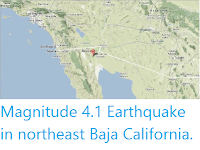The United States Geological Survey
recorded a Magnitude 5.7 Earthquake at a depth of 10 km beneath the Gulf
of California, roughly 74 km off the coast of Sinaloa State, Mexico, at about 8.15 am local time (about 3.15 pm GMT) on Wednesday 29 March 2017. Although this was a large, shallow quake, and
therefore potentially dangerous, it occurred some distance offshore, and
while there are reports of it being felt over a wide area of Baja
California Sur, Sonora and Sinaloa states, there are no reports of any
damage or injuries arising from this event.
The approximate location of the 29 March 2017 Gulf of California Earthquake. USGS.
The boundary between the Pacific and North American Plates runs beneath
the Gulf of California, with Beja California lying on the Pacific Plate
and the Mexican mainland on the North American. The Pacific Plate is
moving northwest with regard to the North American Plate, while the
North American Plate is moving southeast relative to the Pacific Plate.
This creates a transform plate margin along the centre of the Gulf of
California, as the two plates slide past one-another, a margin that
continues northward under California as the San Andreas Fault. The
plates do not move past one-another smoothly, but continuously stick
together then break apart as the pressure builds up, leading to regular
Earthquakes beneath the Gulf of California and in the surrounding area.
Map showing the relative movement of the Pacific and North American
Plates, and the fault system beneath the Gulf of California. Monterey Bay Aquarium.
Witness
accounts of Earthquakes can help geologists to understand these events,
and the structures that cause them. The international non-profit
organisation Earthquake Report is interested in hearing from people who may have felt this event; if you felt this quake then you can report it to Earthquake Report here.
See also...
Follow Sciency Thoughts on Facebook.








